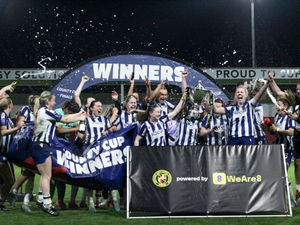Steve Madeley: Pepe Mel 'a brave experiment doomed to failure'
Pepe Mel was neither the problem nor the solution. The Spaniard leaves Albion as the most popular irrelevance in their history.
Mel was not responsible for the malaise that beset the Baggies from the start of a miserable campaign. Yet he found himself powerless to lift it during a brief but abysmal reign that appeared doomed to fail from its earliest moments.
That the likable 51-year-old could become a cult hero for a large contingent of fans despite winning just three of his 17 games says much for the scale of the shambles that unfolded at The Hawthorns this season and supporters' desperation to find any ray of hope.
With his words, his demeanour and his natural and engaging charm, Mel certainly offered hope in a season when so many prominent Baggies figures produced so little to boost the fans' pride.
From their silent chairman to their anonymous chief executive to the vile Nicolas Anelka to so many players who looked either stale or apathetic, there was next to no-one with whom Albion's loyal followers could engage.
So, when Mel arrived in January with an easy manner, warm tone and natural flair for public relations, it took him next to no time to win over a demoralised fanbase.
The brand of football Mel espoused sounded exciting, too. High-tempo, high-pressing, Spanish-style play was the reason the Baggies gave for hiring the former Real Betis man as they looked to transform their philosophy from the counter-attacking, organised approach that had morphed into passive and nondescript during a grim end to Steve Clarke's time at the helm.
The trouble was, the ambitious vision never came close to being translated into reality. Mel's regime was beset by crippling problems, some born of his own failings and others beyond his control.
Concerns were raised at his old club, Real Betis, about their former striker's shortcomings on the coaching field and yet, despite briefly retreating shortly after Christmas, the Baggies ultimately backed Dave McDonough's judgement.
From his earliest days at The Hawthorns, Mel's players were wholly unimpressed with his coaching methods and baffled by the lack of clarity in his instructions, which were filtered from Spanish to English through the widely unpopular analyst McDonough – a man whose growing influence was a huge source of discontent.
There were murmurings almost from the outset about the language barrier, outdated methods and a style of play not conducive to the Baggies' squad.
But matters came to a head on a week-long training camp in Spain, when one senior figure reportedly asked: "Is there any chance of some football training here?"
On the squad's return to England, the players' concerns were relayed to The Hawthorns hierarchy, a series of crisis meetings was convened and Mel was effectively told the new style must now go.
McDonough also left, removing Mel's key behind-the-scenes backer. And with that, the Spaniard was critically undermined.
He became a passenger on a turbulent voyage as players turned to coaches Keith Downing and Dean Kiely, who effectively took the helm for the final couple of months.
Mel remained the charming, acceptable frontman while, in the background, he had a minimal impact on the team.
He could accept little of the credit for the wins at Swansea and Norwich and at home to West Ham, but equally could not be blamed directly for the embarrassing giveaways to Cardiff and Tottenham, although the lack of clear leadership clearly played a part.
Despite a dismal record and few – if any – signs of improvement, Mel became an unlikely champion among Baggies fans and a focal point for discontent with his superiors.
Yet several weeks ago they effectively decided that the experiment was doomed to failure. And in a brief meeting yesterday, Mel received the news he had already accepted was inevitable.
For far too many days of his brief reign he was a smiling, engaging but irrelevant figure in a debacle that ran much deeper than one man.





